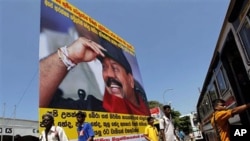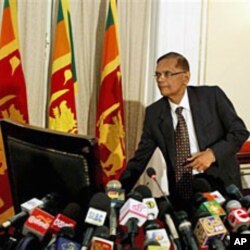Hours before the release of a U.N. report about suspected war crimes committed by Sri Lanka's government, top officials in Colombo are pleading to keep the report secret, arguing it would derail the country's reconciliation process.
Foreign Minister G.L. Peiris said Thursday publication of the report "will cause irreparable damage to the reconciliation efforts of Sri Lanka." Peiris says the United Nations should "reach out to Sri Lanka" as it emerges from"one of its darkest periods."
The report was compiled by three prominent international law experts appointed by U.N. Secretary-General Ban Ki-moon. It accuses both Sri Lanka's Sinhalese-dominated government and insurgent "Tamil Tigers" of atrocities.
However, it says the government systematically attacked hospitals and other civilian targets, and may be responsible for tens of thousands of civilian deaths in the war's final offensive in early 2009. It recommends the U.N. establish a special body to investigate further.
Sri Lankan officials rejected the report immediately after receiving it last week - calling it unsubstantiated and biased.
Paikiasothy Saravanamuttu is the Executive Director of the Center for Policy Alternatives in the Sri Lankan capital. He says the challenge for the Sri Lankan government is to respond to the report in a manner that goes beyond blanket dismissal and denunciation.
"The report... is now a fact, it's out there. So it is incumbent upon the government to look at this in a much more serious and mature way," said Saravanamuttu. "Both in terms of its international relations in general, but also in terms of national unity with reconciliation, and reconciliation with accountability."
The Sri Lankan foreign minister repeated his government's assertion Thursday that the expert panel is not a formal U.N. body, and that it has overstepped its mandate in the content of the report.
Alan Keenan, a senior analyst on Sri Lanka with the International Crisis group, says the gravity of the panel report cannot be so easily dismissed.
"There are substantive claims being made," said Keenan. "They are from a very credible set of people, and they came to the conclusion that there are credible allegations of very serious violations of the laws of war and human rights law, and that they amount potentially to war crimes and crimes against humanity. And the government has to engage with the substance of those claims. They can't hide behind procedural issues."
Keenan rejects Sri Lanka's claim that implementing the report's recommendations would disrupt reconciliation.
"To speak of an ongoing process of reconciliation in Sri Lanka that will be complicated by international and U.N. investigations or interest in the last stages of the war, and the crimes that seem to have been committed, is just nonsensical," Keenan added.
Sri Lanka's own domestic report about the civil war, compiled by what it calls the Lessons Learnt and Reconciliation Commission, is due out next month. The U.N. panel report criticizes the commission as inadequate.





